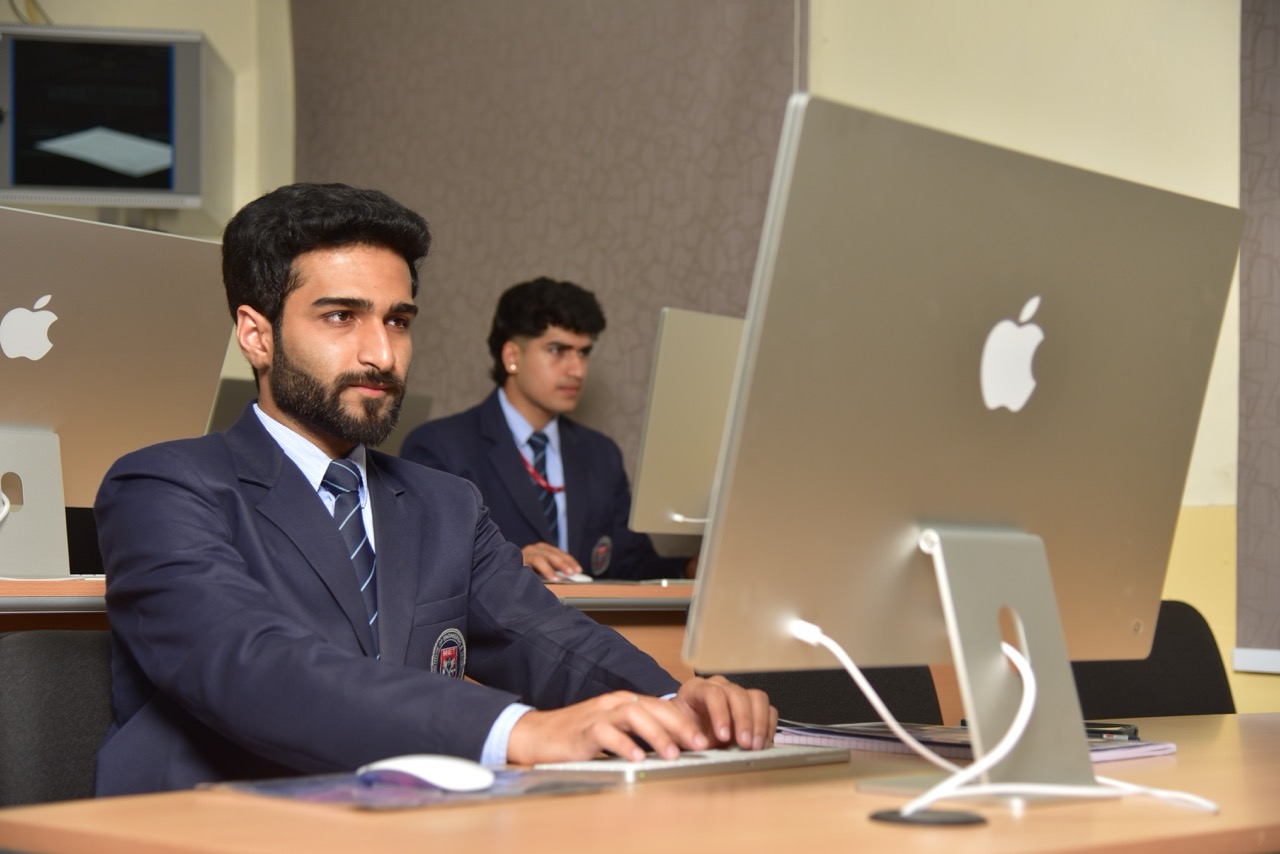CSE (Cyber Security)
As a Computer Science and Cybersecurity student, you’ll develop problem-solving skills, secure digital systems, and protect the future of technology with innovation.
- 4 Years / Onsite
- 60 Seats
Why B.Tech in CSE (Cyber Security) at MIET
The Deptartment of Computer Science and Engineering at MIET is the first and NBA accredited CSE department in the State of J&K, which speaks volumes of the high-quality instruction and training imparted to its students. Manned by highly qualified, committed and dynamic faculty and staff, the department has emerged as the leading departments in the region in terms of placements, university results, alumni, industrial linkages, quality of project work, research and development, extra/co-curricular activities and novel academic initiatives.
Core Courses: Starting from the first semester, the curriculum includes 20 core computing papers, 4 hands-on project-based courses, 6 elective papers, and 8 specialization courses.
Emerging Fields: The curriculum covers emerging fields such as Artificial Intelligence & Machine Learning, Cybersecurity, Blockchain, Cloud Computing, Internet of Things (IoT), and Data Science.
The Training and Placement Cell at MIET’s CSE Department plays a pivotal role in facilitating internships and placements for students, ensuring they gain hands-on experience with industry leaders. The cell actively collaborates with top tech firms, startups, research organizations, and multinational companies to provide diverse opportunities aligned with students’ career aspirations.
Avenues of Placement:
- AI & Data Science Research Labs
- Cybersecurity & Ethical Hacking Firms
- Cloud & DevOps Companies
- Product-Based Tech Companies
- Financial & FinTech Organizations
- Government & Public Sector Tech Roles
- International IT and Consulting Firms
- Startups & Entrepreneurial Ventures
- Software Developers in high-end services or product development IT companies.
- Quality Assurance Engineers undertaking a quality evaluation of software and products.
- Consultants and solution providers.
- Specialists and data-analysts
Detailed Course Components – CSE at MIET
This comprehensive curriculum ensures that students are well-prepared for the ever-evolving field of Computer Science & Engineering, equipping them with both theoretical knowledge and practical skills to thrive in the tech industry.
Core Computing Papers:
The B.Tech in CSE program offers 26 core computing courses, covering essential areas such as:
Programming in C, C++, Python, and Java
Data Structures & Algorithms
Operating Systems & Computer Networks
Database Management Systems (DBMS)
Software Engineering & Agile Development
Artificial Intelligence & Machine Learning
Cybersecurity & Ethical Hacking
Cloud Computing & DevOps
Practical & Industry-Oriented Learning:
The syllabus integrates 4 project-based learning components, enabling students to apply theoretical concepts in real-world scenarios through:
AI & ML Labs
Cloud & DevOps Labs
Cybersecurity & Ethical Hacking Labs
Interdisciplinary Work:
Students explore emerging technologies and interdisciplinary applications, including:
Artificial Intelligence & Deep Learning
Blockchain & Cryptography
Cybersecurity & Privacy Laws
Big Data & Business Intelligence
This holistic approach ensures MIET CSE graduates are industry-ready, equipped with technical expertise, business acumen, and problem-solving abilities to excel in the digital age.
Click here to view
- 50% marks and above in 12th Class.
- Any State or National Level Entrance Exam (CUET) or MET (MIET Entrance Test)
Program Outcomes & Objectives
The Computer Science & Engineering (CSE) program at MIET is designed to equip students with a strong foundation in computing, problem-solving, and emerging technologies. Our well-defined Program Educational Objectives (PEOs), Program Outcomes (POs), and Program Specific Outcomes (PSOs) ensure that graduates are industry-ready, innovative, and committed to professional excellence. These objectives and outcomes guide students in developing technical expertise, ethical responsibility, leadership qualities, and a lifelong learning mindset essential for thriving in the rapidly evolving tech landscape.
Graduates from the Computer Science program at MIET are expected to attain or achieve the following Program Educational Objectives (PEOs) within a few years of graduation:
PEO1: Successfully apply fundamental knowledge of computer science in an innovative manner to solve complex problems.
PEO2: Build successful careers in diverse domains.
PEO3: Demonstrate professional growth and development in their chosen field and/or progress towards an advanced degree.
PEO4: Build reputation for excellence, leadership and ethics.
1. Engineering Knowledge: Apply the knowledge of mathematics, science, engineering
fundamentals, and an engineering specialization to the solution of complex engineering problems.
2. Problem Analysis: Identify, formulate, review research literature, and analyze complex
engineering problems reaching substantiated conclusions using first principles of mathematics,
natural sciences, and engineering sciences.
3. Design/development of solutions: Design solutions for complex engineering problems and
design system components or processes that meet the specified needs with appropriate
consideration for the public health and safety, and the cultural, societal, and environmental
considerations.
4. Conduct investigations of complex problems: Use research-based knowledge and research
methods including design of experiments, analysis and interpretation of data, and synthesis of the
information to provide valid conclusions.
5. Modern tool usage: Create, select, and apply appropriate techniques, resources, and modern engineering and IT tools including prediction and modeling to complex engineering activities with an understanding of the limitations.
6. The engineer and society: Apply reasoning informed by the contextual knowledge to assess societal, health, safety, legal and cultural issues and the consequent responsibilities relevant to the professional engineering practice.
7. Environment and sustainability: Understand the impact of the professional engineering solutions in societal and environmental contexts, and demonstrate the knowledge of, and need for sustainable development.
8. Ethics: Apply ethical principles and commit to professional ethics and responsibilities and norms of the engineering practice.
9. Individual and team work: Function effectively as an individual, and as a member or leader in diverse teams, and in multidisciplinary settings.
10. Communication: Communicate effectively on complex engineering activities with the engineering.
11. Project management and finance: Demonstrate knowledge and understanding of the engineering and management principles and apply these to one’s own work, as a member and leader in a team, to manage projects and in multidisciplinary environments.
12. Life-long learning: Recognize the need for, and have the preparation and ability to engage in independent and life-long learning in the broadest context of technological change.
1. Demonstrate fundamental knowledge in programming, data structures, databases, networks, operating systems, software engineering, and discrete mathematics and possess knowledge of cloud computing, big data, artificial intelligence and other domains in vogue.
2. Demonstrate competence in designing, implementing and testing a computer or software system, solving a real-world problem, by utilizing advanced technologies, platforms and tools.
Labs
MIET has excellent infrastructure including domain-specific laboratories. Industry Leaders such as IBM (IBM Software Center of Excellence), EMC (EMC Center of Excellence) and Cisco (Cisco Networking Academy) have established their labs within the CSE department equipped with the latest hardware and software. MIET CSE students complete on an average 2-3 industry-relevant certifications as value-added programmes giving them a distinct edge over other students when it comes to placements.
Key Features




